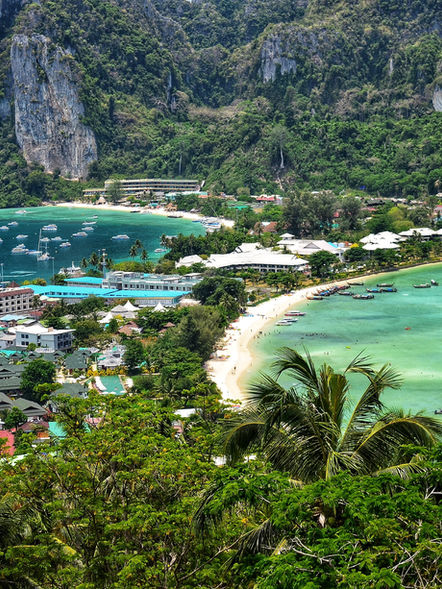Phi Phi Islands - Paradise Lost
- Arin & Arisa Thongtang
- Oct 9, 2023
- 2 min read
In recent years, there has been a remarkable resurgence of sea life around the Phi Phi Islands, situated in Thailand. Notably, the return of sea creatures such as reef sharks and ghost crabs to the area has been a cause for celebration among marine enthusiasts and conservationists. This resurgence can be attributed in part to the dedicated efforts of marine officials who planted an impressive 23,000 corals in the region in 2021.
The Phi Phi Islands have long been a popular destination for tourists, and their fame received an extra boost from the 2000 movie 'The Beach,' starring Leonardo DiCaprio. This film showcased the islands' stunning natural beauty and unique landscapes, capturing the imagination of travelers from around the world. As a result, it ignited a spark of interest in the Phi Phi Islands, making them a must-visit destination for those seeking a picturesque and adventure-filled escape.
To a certain extent, the thriving tourism industry in the Phi Phi Islands has encountered sustainability challenges stemming from the very visitors it attracts. The sheer volume of tourists frequenting the islands has led to a concerning environmental impact. On a daily basis, these visitors generate a staggering 25 to 40 tonnes of waste, which is often inadequately managed and ends up polluting the pristine landscapes of the islands.
The pollution problem extends beyond just waste disposal. The coral reefs, which are critical to the ecological health of the region and are being actively restored through coral planting initiatives, face damage from various sources. The propellers of boat motors, often driven too close to the fragile coral ecosystems, can cause physical harm. Similarly, tourists themselves, while swimming or snorkeling, can inadvertently harm the corals through physical contact or by standing on them.
Furthermore, a concerning practice seen in some cases is the burning of trash or the disposal of garbage directly into the water. Such actions not only mar the natural beauty of the Phi Phi Islands but also threaten the marine life that inhabits the surrounding waters.
Addressing these sustainability challenges is a crucial task for both local authorities and the tourism industry. Sustainable tourism practices, responsible waste management, and heightened environmental awareness among tourists are essential steps toward preserving the delicate ecosystems of the Phi Phi Islands and ensuring they remain a breathtaking destination for generations to come.















Comments